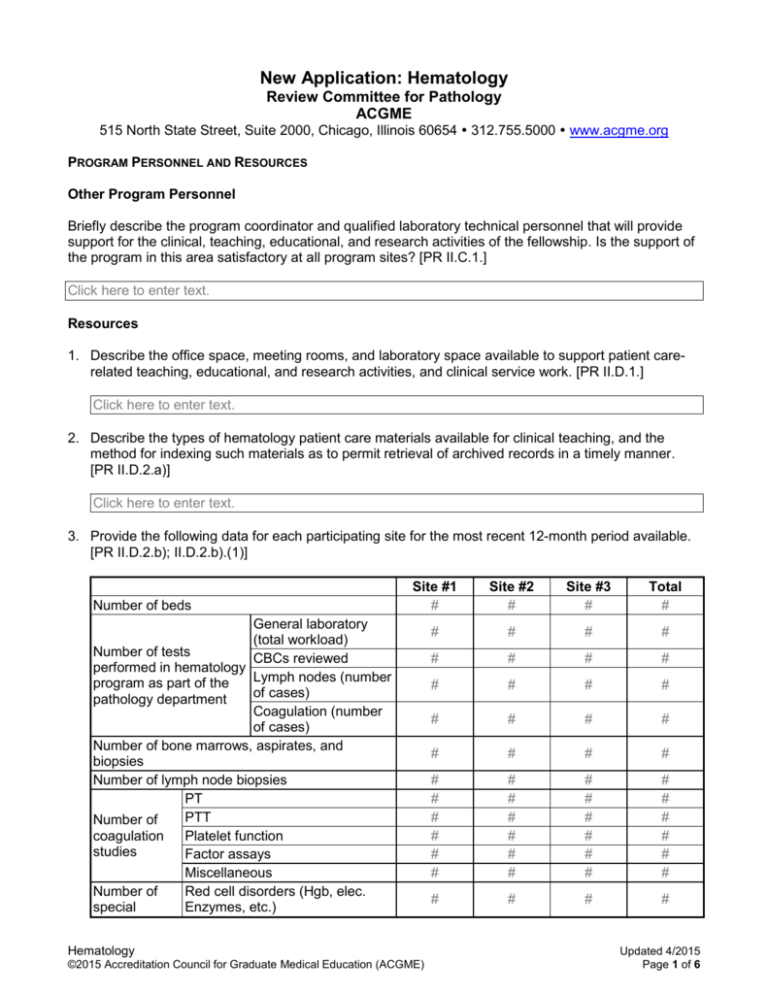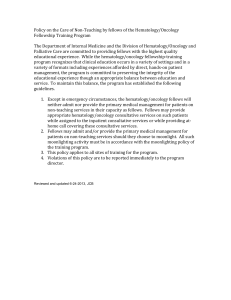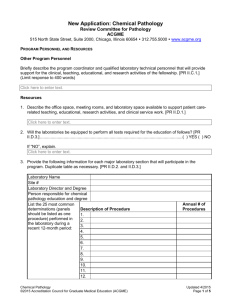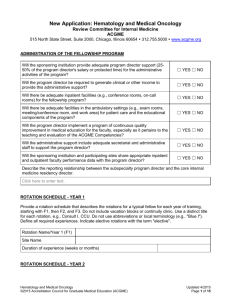Hematology Pathology
advertisement

New Application: Hematology Review Committee for Pathology ACGME 515 North State Street, Suite 2000, Chicago, Illinois 60654 312.755.5000 www.acgme.org PROGRAM PERSONNEL AND RESOURCES Other Program Personnel Briefly describe the program coordinator and qualified laboratory technical personnel that will provide support for the clinical, teaching, educational, and research activities of the fellowship. Is the support of the program in this area satisfactory at all program sites? [PR II.C.1.] Click here to enter text. Resources 1. Describe the office space, meeting rooms, and laboratory space available to support patient carerelated teaching, educational, and research activities, and clinical service work. [PR II.D.1.] Click here to enter text. 2. Describe the types of hematology patient care materials available for clinical teaching, and the method for indexing such materials as to permit retrieval of archived records in a timely manner. [PR II.D.2.a)] Click here to enter text. 3. Provide the following data for each participating site for the most recent 12-month period available. [PR II.D.2.b); II.D.2.b).(1)] Number of beds Site #1 # Site #2 # Site #3 # Total # # # # # # # # # # # # # # # # # # # # # # # # # # # # # # # # # # # # # # # # # # # # # # # # # General laboratory (total workload) Number of tests CBCs reviewed performed in hematology Lymph nodes (number program as part of the of cases) pathology department Coagulation (number of cases) Number of bone marrows, aspirates, and biopsies Number of lymph node biopsies PT PTT Number of coagulation Platelet function studies Factor assays Miscellaneous Number of Red cell disorders (Hgb, elec. special Enzymes, etc.) Hematology ©2015 Accreditation Council for Graduate Medical Education (ACGME) Updated 4/2015 Page 1 of 6 studies in Flow cytometry cases Immunochemistry Molecular (DNA) assays Cytogenetic Studies Miscellaneous Site #1 # # # # # Site #2 # # # # # Site #3 # # # # # Total # # # # # # # # # # # # # Percentage of Adult all clinical material Pediatric (approximate) 4. Indicate the equipment available for fellow education at each site. [PR II.D.3.a)] # of multi-headed microscopes # of individual fellow microscopes Do fellows have individual work stations? (Yes or No) Site #1 # # Choose an item. Site #2 # # Choose an item. Site #3 # # Choose an item. FELLOWS APPOINTMENTS 1. Provide the following information for other educational programs (e.g., other GME programs from this and other sites, residency/fellowship programs for medical technologists, masters and doctoral programs, or post-doctoral programs for clinical scientists) that use program facilities for educational experiences in pathology. Add additional rows as necessary. [PR III.B.2.] Name of Site and Type of Program Length of rotation (in weeks) Maximum number of Maximum number of learners present at the learners per year same time 2. Describe the planned interaction of these other learners with the program fellows. [PR III.B.2.] Click here to enter text. EDUCATIONAL PROGRAM Patient Care Indicate the settings and activities in which fellows will demonstrate competence in the following. Also indicate the method(s) that will be used to assess competence. Hematology ©2015 Accreditation Council for Graduate Medical Education (ACGME) Updated 4/2015 Page 2 of 6 Competency Area Performing procedures, including bone marrow aspiration/biopsy [PR IV.A.2.a).(2).(a)] Diagnostic competence, including: [PR IV.A.2.a).(2).(b)] Analyzing laboratory results, including automated hematology analyzers, coagulation testing, cytogenetics, flow cytometry, immunohistochemistry, and molecular studies, including Fluorescence In Situ Hybridization (FISH) and Polymerase Chain Reaction (PCR) [PR IV.A.2.a).(2).(b).(i)] Interpreting lymph nodes and related tissue pathology [PR IV.A.2.a).(2).(b).(ii)] Interpreting bone marrow aspirates and biopsy specimens [PR IV.A.2.a).(2).(b).(iii)] Settings/Activities Click here to enter text. Assessment Method(s) Click here to enter text. Click here to enter text. Click here to enter text. Click here to enter text. Click here to enter text. Click here to enter text. Click here to enter text. Click here to enter text. Click here to enter text. Medical Knowledge Indicate the activities (lectures, conferences, journal clubs, clinical teaching rounds, etc.) in which fellows will demonstrate expertise in their knowledge in each of the following areas. Also indicate the method(s) that will be used to assess expertise. Area of Expertise Bone marrow pathology, lymph node pathology, peripheral blood and body fluid examination, red cell disorders, hemoglobinopathies, and coagulation [PR IV.A.2.b).(1).(a)] Methods of correlating data from clinical pathology, cytological, and histopathologic assessments of hematologic disease [PR IV.A.2.b).(1).(b)] Pathogenesis, including clinical correlation and prognostic significance, of hematologic disease [PR IV.A.2.b).(1).(c)] Settings/Activities Click here to enter text. Assessment Method(s) Click here to enter text. Click here to enter text. Click here to enter text. Click here to enter text. Click here to enter text. Hematology ©2015 Accreditation Council for Graduate Medical Education (ACGME) Updated 4/2015 Page 3 of 6 Area of Expertise Specimen collection and preparation for routine hematologic testing [PR IV.A.2.b).(1).(d)] Techniques, including flow cytometry, molecular techniques, and automated hematology procedures [PR IV.A.2.b).(1).(e)] The operation and management of hematology and relevant specialty laboratories, including quality control procedures, assay development, quality improvement activities, and laboratory regulations [PR IV.A.2.b).(2)] Settings/Activities Click here to enter text. Assessment Method(s) Click here to enter text. Click here to enter text. Click here to enter text. Click here to enter text. Click here to enter text. Practice-based Learning and Improvement 1. Briefly describe one planned quality improvement activity or project that will allow fellows to demonstrate an ability to analyze, improve, and change practice or patient care. Describe planning, implementation, evaluation, and provisions of faculty member support and supervision that will guide this process. [PR IV.A.2.c).(1)] (Limit response to 400 words) Click here to enter text. 2. Briefly describe one example of a learning activity in which fellows engage to develop the skills needed to locate, appraise, and assimilate evidence from scientific studies and apply it to their patients' health problems. [PR IV.A.2.c).(2)] (Limit response to 400 words) The description should include: Locating information Appraising information Assimilating evidence information (from scientific studies) Applying information to patient care Click here to enter text. 3. Briefly describe how fellows will receive and incorporate formative evaluation feedback into daily practice. (If a specific tool is used to evaluate these skills, have it available for review by the site visitor.) [PR IV.A.2.c).(3)] (Limit response to 400 words) Click here to enter text. 4. Briefly describe one learning activity in which fellows will demonstrate competence in using information technology to optimize learning and improve patient care. [PR IV.A.2.c).(4)] (Limit response to 400 words) Click here to enter text. Hematology ©2015 Accreditation Council for Graduate Medical Education (ACGME) Updated 4/2015 Page 4 of 6 Interpersonal and Communication Skills 1. Briefly describe one learning activity in which residents demonstrate interpersonal and communication skills that result in the effective exchange of information and collaboration with patients, their families, and health professionals. [PR IV.A.2.d)] (Limit response to 400 words) Click here to enter text. 2. Briefly describe one learning activity in which fellows demonstrate competence in providing appropriate and effective consultations to other physicians and health professionals, both intra- and inter-departmentally, including providing medical advice on the diagnosis and management of hematologic disorders. [PR IV.A.2.d).(1); IV.A.2.d).(1).(a)] (Limit response to 400 words) Click here to enter text. 3. Briefly describe one learning activity in which fellows demonstrate competence in effective verbal and written communication. [PR IV.A.2.d).(2)] (Limit response to 400 words) Click here to enter text. 4. Briefly describe how fellows will be provided with opportunities to maintain comprehensive, timely, and legible medical records, if applicable. [PR IV.A.2.d).(3)] (Limit response to 400 words) Click here to enter text. Professionalism Briefly describe the learning activity(ies), other than lecture, by which fellows demonstrate a commitment to carrying out professional responsibilities and an adherence to ethical principles. [PR IV.A.2.e)] (Limit response to 400 words) Click here to enter text. Systems-based Practice 1. Describe the learning activity(ies) through which fellows demonstrate an awareness of and responsiveness to the larger context and system of health care, as well as the ability to call effectively on other resources in the system to provide optimal health care. [PR IV.A.2.f)] (Limit response to 400 words) Click here to enter text. 2. Describe an activity that fulfills the requirement for experiential learning in identifying system errors and implementing potential systems solutions. [PR IV.A.2.f).(1)] (Limit response to 400 words) Click here to enter text. Curriculum Organization and Fellow Experiences 1. List the planned conference schedule for fellows. Add additional rows as necessary. [PR IV.A.3.a)] Hematology ©2015 Accreditation Council for Graduate Medical Education (ACGME) Updated 4/2015 Page 5 of 6 Name of Conference Frequency Responsible Department Required? (Yes/No) Attendance Taken? (Yes/No) 2. Describe fellow participation in these conferences. How much responsibility will they have for their preparation and presentation? [PR IV.A.3.a).(1)] Click here to enter text. 3. Briefly describe how the fellow will work in interprofessional teams. [PR VI.F.1.] Click here to enter text. Hematology ©2015 Accreditation Council for Graduate Medical Education (ACGME) Updated 4/2015 Page 6 of 6





